Vegetable Guide for Your Husky's Diet
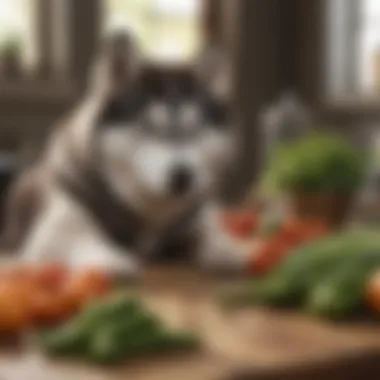
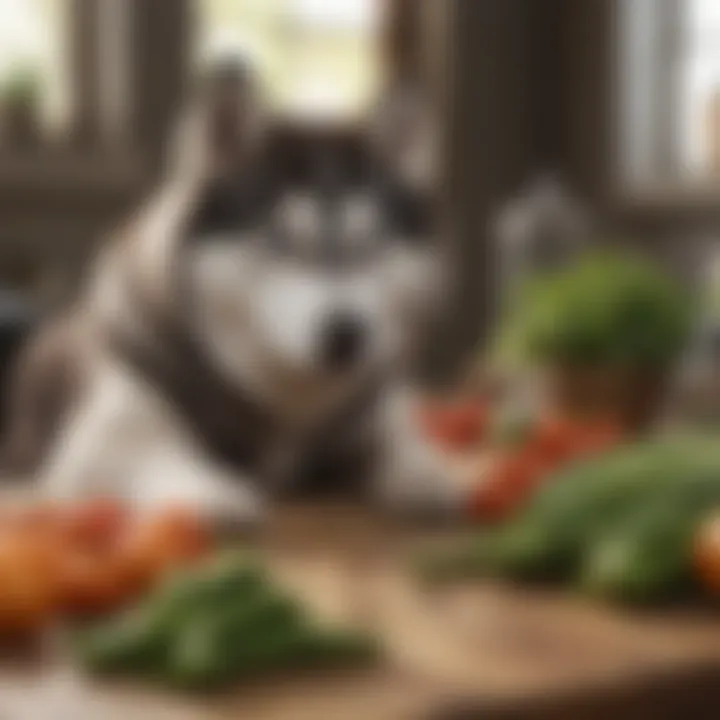
Intro
Pet owners are always on the lookout for ways to enhance their dogs' diet. For those who own a husky, incorporating vegetables can play a crucial role in promoting overall health. This article aims to shed light on the suitability of various vegetables for huskies, their nutritional benefits, and potential risks associated with vegetable consumption. By providing solid information and guidelines, this guide empowers dog owners to make informed dietary decisions. Let's delve deep into understanding what huskies need in their meals.
Animal Profile
General Overview
The Siberian husky is a powerful and stunning breed, originally bred for pulling sleds across snowy terrains. They’re well-known for their striking blue or multi-colored eyes and thick, double coats that protect them against the harsh cold. Huskies are a highly energetic breed that requires plenty of exercise and stimulation, making their dietary needs particularly important to support an active lifestyle. When caring for such spirited dogs, understanding their nutrition becomes pivotal.
Habitat and Distribution
Historically, huskies hail from the Siberian region of Russia, a place where the cold climate greatly influenced their physicality and needs. Nowadays, they can be found in various parts of the world, living in urban settings as well as rural ones, always being the beloved companions of their owners. Despite their versatility in living conditions, their diets must remain tailored to fit their biological needs.
Fascinating Facts
Unique Traits and Adaptations
Huskies have unique traits that set them apart. For instance, their thick coat not only serves to keep them warm during icy winters but also requires specific grooming and care in milder climates. Additionally, they have excellent stamina, and as such, their bodies are adapted to utilize energy efficiently. When adding vegetables to their diet, owners need to consider how these food choices align with these naturally adapted traits.
Historical and Cultural Significance
The historical significance of huskies cannot be understated. They played essential roles in the livelihoods of indigenous peoples who relied on them not only for transportation but as guardians and companions. This cultural backdrop adds another layer of responsibility for modern owners to honor this heritage by ensuring their huskies have the proper diet reflective of their lineage.
Conservation Status
Current Population Trends
While huskies are a popular breed today, ones from pure breeding lines can sometimes suffer from genetic health issues. It’s essential for breeders to focus on ethical practices that promote health rather than just appearance. A well-informed owner can contribute to healthy population trends by properly caring for their husky.
Threats and Challenges
Among the threats faced by huskies, improper diet and lifestyle choices can lead to obesity and other health issues. Furthermore, some urban settings may not provide the necessary outlets for their high energy levels, often leading to behavioral problems. Understanding vegetable consumption and proper nutrition becomes a crucial part of their care.
Care Tips for Pet Owners
Basic Needs and Requirements
Huskies require a balanced diet that includes protein, healthy fats, and carbohydrates; vegetables can supplement this diet by providing essential vitamins and minerals.
- Protein Sources: Chicken, lamb, and fish should be base meats in their meals.
- Healthy Fats: Omega-3 fatty acids can be sourced from fish oil or flaxseed.
- Carbohydrates: Whole grains and legumes are good choices, alongside safe vegetables.
Health and Wellness Tips
Keeping the husky healthy goes beyond food. Regular check-ups, socialization, and physical activities are necessary to keep them thriving.
- Include Variety: Mix different vegetables for a broader nutrient profile.
- Watch for Allergies: Always be cautious about new additions to their diet.
- Moderation is Key: Too many veggies can upset their stomachs, so introduce them slowly.
"Proper nutrition is just as critical as exercise for maintaining the health of a husky. You can't have one without the other."
Understanding how vegetables fit into a husky's diet is vital. As we move forward, we will discuss specific vegetables safe for huskies, their benefits, and practical ways to incorporate them into daily feeding routines.
Preface to Canine Nutrition
Understanding canine nutrition is vital for ensuring the overall health and well-being of our furry companions. When it comes to huskies, a breed known for its unique characteristics and energetic lifestyle, the significance of a well-balanced diet becomes even more pronounced. The nutritional needs of huskies can vary considerably from those of other dog breeds, given their origins as working dogs in extreme climates. It’s not just about feeding them; it’s about nourishing them in a way that aligns with their specific needs.
Pet owners must appreciate that a balanced diet extends beyond the typical kibble and meat-fed regimen. Whole foods, including a range of vegetables, can enhance nutrient absorption and provide a scope of vitamins and minerals essential for growth, energy, and longevity. Notably, incorporating vegetables into a husky's diet can promote proper digestion, manage weight, and boost their immune system.
The Importance of a Balanced Diet
A balanced diet for huskies is not merely an ideal; it’s an absolute necessity. The complexities of their metabolic system require a rich array of nutrients that can often be derived from various food sources. Dogs, including huskies, are omnivores by nature, which means they can thrive on both animal-based proteins and plant-based foods.
However, it's crucial to understand the ratios and specific needs relevant to this particular breed. The following points highlight the importance of a balanced diet for huskies:
- Physical Health: A diet that is deficient in essential nutrients can lead to health problems such as obesity, skin issues, and even joint difficulties.
- Energy Levels: Huskies are high-energy dogs, and they require adequate fuel to maintain their activity levels, especially when engaging in rigorous exercise.
- Digestive Health: Vegetables provide fiber that supports healthy digestion, which is particularly important in a breed that can be prone to certain gastrointestinal issues.
"A proper diet is essential for maintaining the exuberance and health of huskies throughout their lives."
Feeding huskies the right combination of nutrients can also influence their coat condition and overall appearance. A shiny coat reflects good health, and many vegetables contribute to this. Additionally, the emotional and behavioral health of a dog is intertwined with its nutrition. A well-fed husky is often a happier, more balanced dog.
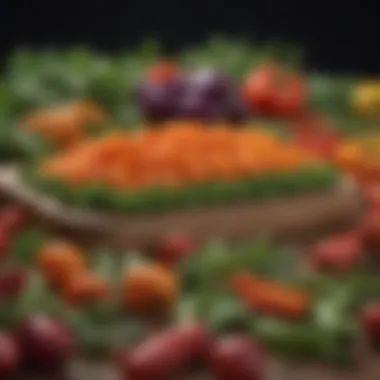
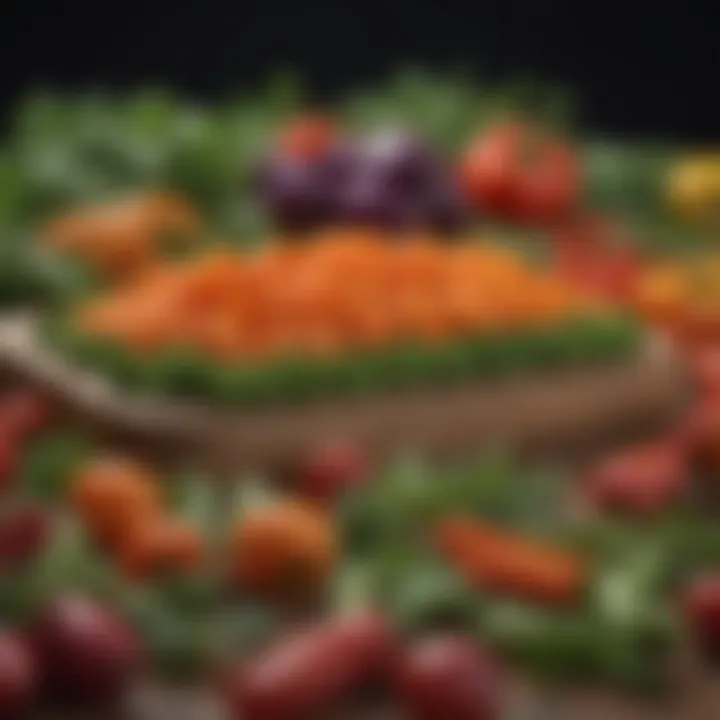
In sum, understanding canine nutrition, especially for huskies, lays the groundwork for making informed dietary choices that can significantly enhance their quality of life.
Understanding the Husky Breed
To grasp the dietary requirements of a Husky, it’s essential to first delve into the breed's characteristics. Huskies are athletic and energetic animals, originally bred by the Chukchi people of Siberia to pull sleds over long distances. Their high-level stamina and strength make them unique when it comes to nutritional needs. Rather than merely being fed as typical house dogs, their dietary intake should mirror their active lifestyles.
Unique Dietary Needs
When considering the unique dietary needs of Huskies, we confront two critical factors: their ancestry and their energetic nature. Huskies are primarily carnivorous, but unlike some breeds that have adapted to be strictly so, they thrive on a more varied diet. Incorporating vegetables into their meals isn’t just a trendy option; it is a beneficial choice that can mitigate deficiencies in vitamins and minerals, fostering overall health.
- Vitamins and Minerals: Huskies can particularly benefit from vitamins A, C, and K, which are all abundantly found in vegetables. These nutrients play a vital role in immune function and bone health, which are crucial for active dogs.
- Fiber Content: Adding vegetables can boost the fiber in their diet. Fiber supports good digestion, which is an often overlooked aspect of canine health. A healthy gut can assist in the absorption of essential nutrients from their food.
Keeping in mind, however, that not all vegetables are suitable for them is key. Owners should familiarize themselves with which options are beneficial and which pose potential risks.
Energy Levels and Metabolism
Huskies exhibit a unique metabolism, marked by their ability to convert food into energy efficiently. Their high energy levels can be attributed to their historical role in rigorous physical labor. When considering vegetable consumption, owners should recognize that these dogs often require more calories than less active breeds.
- Caloric Requirement: Huskies may require between 1,000 and 1,600 calories per day, depending on their age, size, and activity levels. Understanding their energy requirements helps in managing their weight and ensuring optimal health.
- Weight Management: The inclusion of vegetables as fillers can help maintain their weight. Instead of just focusing on meat, adding low-calorie vegetables can help owners prevent overfeeding with calorie-dense foods while still meeting their dog’s nutrient needs.
Additionally, the metabolic rates of Huskies can fluctuate with activity levels. During rest periods after vigorous exercise, their bodies adapt, and maintaining a balanced diet aids in this process.
In summary, understanding the Husky breed lays the foundation for recognizing their distinct dietary needs. Their heavy reliance on energy and specific nutrient intake necessitates a thoughtful approach to incorporating safe vegetables into their meals. This knowledge equips pet owners to make informed choices that prioritize their furry companions’ health.
Vegetables: An Overview
When it comes to enhancing a husky's diet, vegetables often play a vital role. These colorful additions are not just a mere garnish; they provide essential nutrients that can support canine health, particularly for active breeds like huskies. Incorporating vegetables into your dog's meals can offer a variety of benefits, including improved digestion, enhanced immune function, and an overall boost in energy levels.
Most pet owners might think of vegetables as filler, but they are packed with vitamins, minerals, and antioxidants that promote health. Huskies, with their unique physiology, can greatly benefit from these plant sources. For example, fiber helps regulate their digestive systems, while vitamins A and C contribute to skin and coat health. Moreover, low-calorie veggies like carrots and green beans can help manage weight without sacrificing satisfaction.
However, it's essential to remember that not all vegetables are created equal. Some may pose risks that could harm your furry companion. Being aware of these factors ensures that the effort to include veggies in their diet reaps positive outcomes. Understanding the comprehensive view of vegetables in a husky's diet sets the foundation for more specialized discussions surrounding benefits and possible pitfalls.
Nutritional Benefits of Vegetables
Vegetables shine when it comes to nutritional value. They are generally rich in vitamins, minerals, and fiber, making them crucial for a balanced diet. Huskies can particularly benefit from specific nutrients found in various vegetables. For instance, carrots can deliver a hearty dose of beta-carotene, which is converted into vitamin A, vital for good vision and skin health.
Some notable benefits include:
- Rich in Antioxidants: Vegetables like broccoli and spinach contain antioxidants that fend off free radicals, potentially reducing the risk of chronic diseases.
- Support Digestive Health: High fiber content in vegetables like green beans and pumpkin aids in digestion and can help maintain a healthy weight.
- Hydration: Many vegetables, such as cucumbers, have a high water content, helping to keep your husky hydrated.
Utilizing the right vegetables can lead to an overall improvement in your dog's well-being, offering both immediate health benefits and long-term immunity boost.
Potential Risks and Precautions
While many vegetables offer significant health benefits, it's vital to approach their consumption with caution. Not every veggie is suitable for huskies, and some can even be harmful. Certain vegetables can cause toxicity, while others might lead to digestive issues if not prepared properly.
Here are some precautions to consider when integrating vegetables into your husky's diet:
- Avoid Toxic Vegetables: Onions and garlic, for example, can lead to severe health complications, including anemia.
- Preparation Matters: Cooking certain vegetables, like potatoes, is essential. Raw potatoes can contain solanine, which is toxic to dogs.
- Monitor Changes: Whenever introducing new vegetables, keep an eye on any changes in your husky's behavior or digestion. If you notice any adverse reactions, consult a veterinarian immediately.
In summary, understanding the comprehensive role of vegetables is an essential part of ensuring your husky receives adequate nutrition. Balancing their benefits with potential risks will not only boost their health but also lead to a more satisfied pup.
Safe Vegetables for Huskies
When it comes to keeping our furry companions healthy and happy, the right ingredients in their diet are of utmost significance. For huskies, incorporating safe vegetables can contribute essential nutrients that enhance their overall well-being. Most importantly, these veggies not only serve as health boosters but also act as a delightful addition to their meals, making dinner time much more enjoyable.
Herein, we delve into several vegetables that huskies can safely enjoy, each providing unique benefits. It’s imperative for pet owners to consider not just the nutritional content but also how these foods interact with canine physiology. Huskies, like many dog breeds, require a balanced intake of nutrients, and vegetables can complement their proteins and fats. However, one must tread carefully to ensure the right choices are made, as not all plant foods are friendly to our four-legged friends.
Each of the vegetables discussed here not only serves as a tasty treat but also supports various bodily functions—from digestion to immune responses. Let's dive into a closer examination of these safe options.
Carrots: Crunchy and Nutritious
Carrots are often celebrated as a fantastic choice for huskies due to their rich vitamin A content, which is pivotal for maintaining good vision and a healthy skin. The crunchiness of carrots makes them naturally appealing to dogs. They can be served raw or cooked, though serving them raw taps into their full nutritional potential. Also, the act of chewing on crunchy vegetables can help maintain dental health by reducing plaque accumulation.
It's easy to introduce carrots into your husky's diet. Slice them into manageable pieces to prevent choking, and let your dog enjoy this vibrant snack during playtime or training sessions. As with any new food, moderation is key to ensure there are no digestive upsets.
Sweet Potatoes: A Healthy Source of Fiber
Sweet potatoes are another top contender in the vegetable repertoire for huskies. They provide a good dose of dietary fiber, which is crucial for aiding digestion and preventing constipation. Furthermore, sweet potatoes are packed with vitamins C and A, essential for immune health and overall vitality.
When preparing sweet potatoes for your husky, make sure to cook them thoroughly. Raw sweet potatoes can be tough for dogs to digest. Baking or boiling softens the texture, making it easier for your dog to consume and absorb nutrients effectively. When served in moderation, sweet potatoes can be a satisfying and nutritious addition to your dog’s meals.
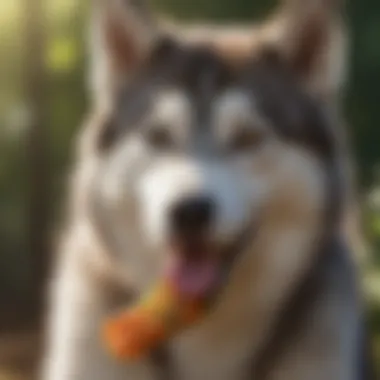
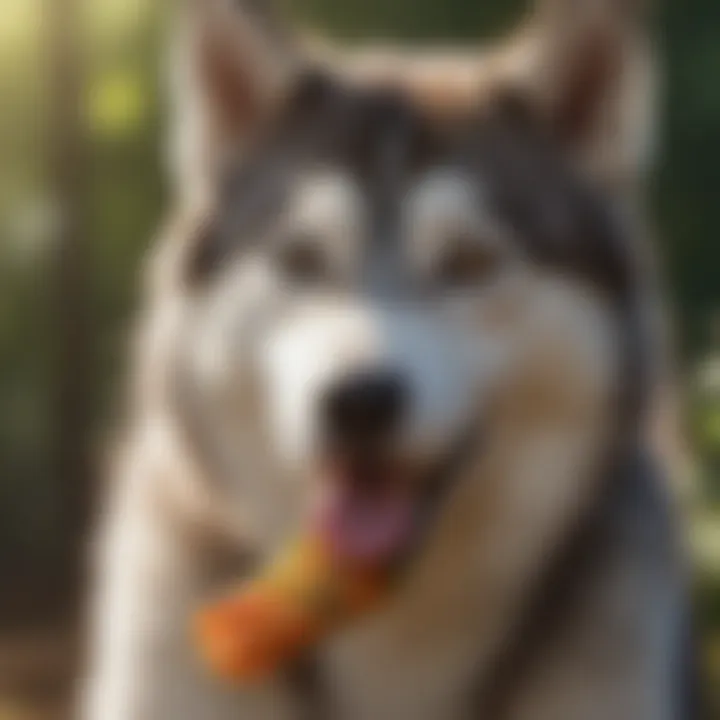
Green Beans: Low-Calorie Snack
Green beans present a low-calorie option for pet owners mindful of their husky’s weight. They are rich in fiber, which can help dogs feel full without unnecessary calories. This makes green beans a very appealing snack for huskies that might be prone to weight gain or require a diet management strategy.
Dogs can enjoy green beans cooked or raw, but it is recommended to avoid adding salt or seasoning. You can offer them whole or cut them into bite-sized pieces to make them easier to chew. A sprinkle of green beans mixed into a meal can enhance its nutritional profile without complicating your dog’s dietary plan.
Peas: Packed with Protein
Peas are often overlooked yet are a powerhouse of nutrients. They pack a protein punch and are rich in various vitamins and minerals, including vitamin K, which supports healthy bones. Their sweet flavor is likely to catch your husky's attention, making them an enjoyable snack as well.
You can choose fresh or frozen peas, and they can be served raw or lightly steamed. It’s important, however, to avoid using canned peas as they often contain unnecessary additives and salt. Mixing a handful of peas into their regular food can add variety and nutrition without overwhelming their digestive system.
Pumpkin: Aid for Digestion
Pumpkin is widely regarded as a digestive ally for dogs. It’s known for its substantial fiber content, which can help regulate bowel movement and keep the digestive system functioning smoothly. Additionally, pumpkin is rich in vitamins A, C, and E, making it an excellent supplement for boosting overall health.
When introducing pumpkin, ensure it is pureed or mashed and avoid any products with added sugars or spices. Plain canned pumpkin is a great option. Just a spoonful mixed into your husky’s food can do wonders for their tummy. This not only enhances taste but also provides hydration, especially important during warm seasons.
"Using safe vegetables in your husky's diet is not just about preventing health problems; it is also about enriching their life through variety and taste."
Incorporating these safe, nutritious vegetables into your husky’s meals can benefit their health, enhance their dietary experience, and just make life a little more flavorful. As with any dietary change, it’s wise to observe how your dog reacts to new foods, adjusting portions and choices as necessary. Prioritizing their dietary needs helps build a vibrant and energetic life for your beloved huskies.
Vegetables to Avoid
When discussing the dietary habits of huskies, it's essential to highlight those vegetables that could pose risks instead of benefits. While many vegetables provide significant nutrients, there are specific ones that can lead to serious health issues. Understanding these hazards enables pet owners to make informed decisions about their furry friends' diet, ultimately promoting better health and avoiding unexpected complications.
Onions and Garlic: Toxicity Risks
Onions and garlic are part of the Allium family of vegetables, which are particularly toxic to dogs. Even in small amounts, they can cause oxidative damage to red blood cells, leading to a condition called hemolytic anemia. Symptoms of onion or garlic toxicity may not appear immediately, often sneaking up on owners days after ingestion.
- Signs to watch for include:
- Weakness
- Vomiting
- Diarrhea
- Pale gums
Understanding the toxicity levels is crucial. Raw, cooked, or even dehydrated forms of these vegetables can be harmful. Even the powdered or sauce forms found in some foods can be dangerous. If you suspect your husky may have eaten any form of onion or garlic, it’s best to consult with your veterinarian without delay.
Potatoes: Considerations on Preparation
Potatoes may seem harmless, but they require careful consideration when included in a husky’s diet. Raw potatoes, particularly the green parts and sprouted potatoes, contain solanine, a toxic compound. Cooking reduces this toxicity, but it’s not entirely removed, so great care must be taken.
A few points to consider:
- Preparation: Always cook potatoes thoroughly and avoid adding any deadly seasonings like salt or butter.
- Moderation: Even cooked potatoes should be served sparingly, as they are starchy and can lead to weight gain.
It's wise to remember that dogs derive more nutritional benefits from vegetables that are specifically safe, like carrots or green beans. In a nutshell, if potatoes are to be included, they should be treated as an occasional ingredient rather than a staple.
Mushrooms: A Risky Choice
Mushrooms can be a gamble. While some varieties are safe for dogs, many are not. The danger lies in the variety, as it's not always easy to distinguish between edible and toxic mushrooms without expert knowledge. Toxic varieties can cause severe gastrointestinal distress, liver damage, or even death.
Some key guidelines when considering mushrooms are:
- Avoid Wild Mushrooms: If you're unsure about the type, it's better to skip them altogether.
- Safe Options: If you choose to include mushrooms, stick to common types like white button mushrooms, which are generally safe but should be served cooked.
Keeping a keen eye on your boy or girl when it comes to foraging or sharing human foods is crucial. Even if a mushroom is deemed safe, it should never overtake the primary food sources in a husky's diet.
"Sometimes it’s what we leave out that matters most in crafting a diet that nourishes and protects our pets."
Awareness and understanding about what vegetables to avoid are critical in ensuring the health and nourishment of your husky. Each choice made in their diet reflects significantly on their overall well-being. Learning about these risks allows owners not just to protect their pets but to also enable them to thrive.
Incorporating Vegetables into the Husky's Diet
Incorporating vegetables into a Husky's diet is not merely about adding variety to their meals. It's a key aspect that can significantly contribute to their overall health and well-being. Huskies are an energetic breed, and proper nutrition plays a crucial role in maintaining their energy levels and supporting their active lifestyle. Vegetables can provide essential vitamins, minerals, and fiber that help in digestion and enhance the immune system.
When thinking about those angry-looking canine teeth chomping on crunch veggies, it's easy to dismiss the notion that they can enjoy anything else besides meats and kibble. However, just as humans benefit from a diverse diet, so too do our four-legged friends. The right vegetables offer benefits that range from improving the condition of their fur to aiding in weight management.
Understanding Portion Sizes
A common concern for pet owners is how much vegetable they should feed their Huskies. The answer isn’t as straightforward as it seems. Huskies, being influenced by their metabolism and energy needs, require different portion sizes than other breeds or individual dogs. A general guideline is to keep vegetable treats around 10-15% of their daily caloric intake. But this is where it can get tricky. Every Husky has unique needs, depending on factors like age, activity level, and overall health.
- Small Portions: When introducing new vegetables, it's wise to start with small amounts. This helps monitor how your Husky reacts, both in terms of taste and digestion. Too much too soon can lead to gastrointestinal upset.
- Big Dogs, Big Portions?: Just because they are larger doesn’t mean they require massive vegetable servings. They still need moderation.
- Regular Re-evaluation: As they age or if their energy levels change, revisit the portions. What works one month may not suit them later on.
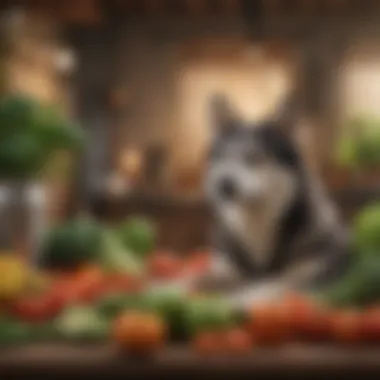
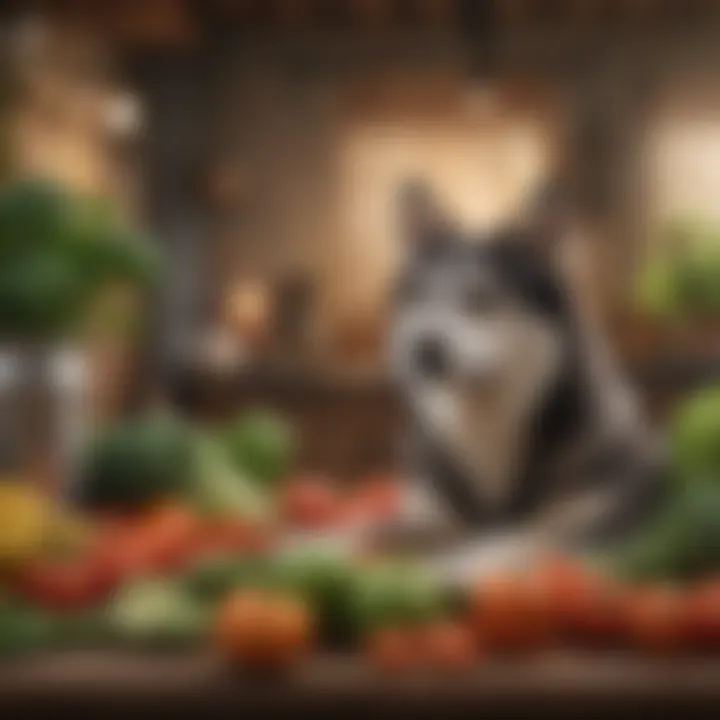
By gauging how their body reacts, you can fine-tune those serving sizes accordingly. Shake a leg to the local supermarket or better yet, your own garden and get fresh, vibrant veggies that your furball could munch on — but don’t go overboard.
Introducing New Vegetables Gradually
So, what about introducing new types of green goodness? This can be the make-or-break point for the Husky’s acceptance of vegetables. Tossing a whole carrot into their food bowl can have them giving you the side-eye, skeptical of your intentions. A gradual introduction is the name of the game.
- Mixing In: Start by mixing a small amount of a new vegetable into their regular food. This could be as simple as finely chopping spinach or steaming some broccoli. Monitor their reaction closely.
- Observer Mode: Pay attention to any changes in their digestion or appetite. If they seem to be seizing or if there’s a sudden aversion, it might be time to retry or hold off.
- One at a Time: Stick to introducing one new vegetable at a time. It’s tempting to offer a medley, but it could lead to confusion in case of any tummy troubles.
- Positive Reinforcement: If your Husky takes to the new veggie like a champ, reward them with praise or even a small treat. They need to learn that this new addition isn’t just another food experiment!
By following these simple steps, you can create a well-rounded diet for your Husky that includes the nutritional benefits of vegetables without overwhelming their sensitive digestive system. The objective is not just to toss greens in their diet haphazardly but to make it a seamless part of their daily meals. This can help lay the groundwork for a happy, healthy Husky with a penchant for munching on veggies!
Homemade Vegetable Treats for Huskies
In the realm of canine nutrition, the significance of homemade vegetable treats cannot be overstated. While commercial dog treats may be convenient, they often contain additives and preservatives that may not align with the optimal health needs of huskies. Homemade options offer pet owners the unique opportunity to control ingredients, tailoring treats to the dietary requirements and preferences of their furry companions. Additionally, crafting these delights at home can forge a deeper connection between owner and pet, fostering companionship through the shared experience of cooking. Moreover, preparing vegetable treats means you can pick fresh and nutrient-rich veggies that provide essential vitamins and minerals.
Incorporating vegetables into your husky’s diet through treats allows you to enhance their overall well-being without sacrificing taste. Huskies, known for their high energy, thrive on a diet that includes not just meats, but wholesome plant-based nutrients as well. Thus, homemade treats can serve as effective rewards during training sessions or simply as a delightful snack in between meals, ensuring your husky remains engaged and satisfied throughout the day.
Simple Recipes to Try
Getting started with homemade vegetable treats is both easy and gratifying. Here are some straightforward recipes you can whip up in your kitchen:
- Carrot and Peanut Butter Bites
Ingredients:Instructions: - Pumpkin and Spinach Treats
Ingredients:Instructions:
- 1 cup of grated carrots
- 1 cup of whole wheat flour
- 1/2 cup of peanut butter (make sure it's xylitol-free)
- 1/4 cup of water
- Preheat your oven to 350°F (175°C).
- In a large bowl, mix grated carrots and peanut butter.
- Gradually add the flour and water, mixing until a dough forms.
- Roll into small balls and flatten slightly.
- Place on a baking sheet and bake for 20-25 minutes until golden brown.
- 1 cup of canned pumpkin (plain, not spiced)
- 1/2 cup of finely chopped spinach
- 2 cups of oat flour
- 1 egg
- Preheat oven to 350°F (175°C).
- Combine pumpkin, spinach, egg, and oat flour in a mixing bowl.
- Knead the mixture until dough is formed.
- Roll out and cut into shapes.
- Bake on a lined baking sheet for about 30 minutes.
These treats not only provide health benefits but also allow for experimentation with different vegetable combinations. Remember to always introduce new ingredients gradually to monitor for any adverse reactions.
Storage and Shelf Life
To ensure the longevity and freshness of your homemade treats, proper storage is crucial. Here are some practical tips:
- Cool Down Properly: Before storing, allow the treats to cool completely to prevent moisture buildup, which could lead to mold.
- Airtight Container: Store the treats in an airtight container at room temperature to maintain their texture and taste.
- Refrigeration: If made in large batches, consider refrigerating them to extend their shelf life. Under these conditions, they can last up to two weeks.
- Freezing for Extended Storage: For treats intended for longer durations, freezing is an excellent option. Placing them in a freezer bag can allow for several months of preservation. Simply thaw out portions as needed.
In summary, homemade vegetable treats serve a dual purpose of nutrition and enjoyment. Simple recipes that incorporate safe vegetables can enhance a husky's diet while also being a fun and engaging project for pet owners. Remember to keep an eye on treat storage to maintain freshness and quality, ensuring your furry friend gets the best possible snacks.
Seeking Professional Guidance
When it comes to ensuring a well-rounded diet for your husky, the path can often feel twisted and confusing. The significance of seeking professional guidance can't be overstated in this arena. Proper management of vegetable intake plays a pivotal role in your dog's overall health, and understanding this requires expertise from those well-versed in canine nutrition. Consulting with veterinarians and utilizing nutritional counseling services can provide you with the nuanced insight necessary to cater to your husky's unique dietary requirements.
Consulting with Veterinarians
Veterinarians are your go-to source when navigating the complexities of what huskies need. They bring a wealth of knowledge to the table, grounded in both science and experience. Regular check-ups can help identify any specific health issues, potential allergies, or sensitivities your husky might have. It’s not just about putting together a meal plan; it’s about ensuring that every ingredient contributes positively to your furry friend’s well-being.
- Tailored Advice: Your vet can assess individual needs based on age, weight, activity level, and current health status. What works for one husky may not work for another.
- Preventive Care: Nutrition is often foundational for preventing health problems. Consulting with a vet ensures you focus on proactive measures rather than reactive ones.
- Informed Decision Making: They can guide you on introducing new vegetables gradually, minimizing the risk of digestive upset.
"A consultation once can save months of worry; keeping your pet healthy is certainly a labor of love, but it shouldn’t be guesswork!"
Nutritional Counseling Services
In addition to your vet, nutritional counseling services are increasingly available and can offer an extra layer of support. These specialists often combine principles of veterinary science and dietary guidelines specifically for canines. They can decode the often bewildering world of pet food labels and vegetable nutrition, breaking it down into digestible nuggets of information.
- Customized Dietary Plans: A nutritionist can help formulate a plan that caters to your husky's specific health needs and lifestyle.
- Educational Workshops: Some services offer workshops or seminars. This is a golden opportunity to learn from experts and ask questions in a group setting.
- Continuous Support: They provide ongoing guidance as you change or adapt your dog’s diet, ensuring it's aligned with their evolving needs as they age or face new health challenges.
Both veterinarians and nutritional counselors can empower pet owners with the knowledge necessary to make informed choices. Connecting with professionals is essential to avoid any missteps in this significant part of your dog's life. The consequences of neglecting proper diet can have long-lasting implications, so taking these steps is not just sensible; it's essential.
Epilogue
In summing up the various insights regarding vegetable consumption for Huskies, it’s clear that this topic bears immense significance in ensuring their overall canine health. A well-balanced diet, rich in essential nutrients and appropriate portions, can enhance the well-being of these active animals. Failing to recognize the nutritional advantages and potential pitfalls associated with incorporating vegetables into a Husky's diet may lead to unforeseen health issues.
Summarizing Key Points
- Veggies as Nutritional Powerhouses: Including safe vegetables like carrots, sweet potatoes, and green beans can provide Huskies with vitamins, minerals, and fibers that support digestion and energy levels.
- Understanding Risks: Not all vegetables are friendly; it's paramount to avoid toxic options such as onions and garlic, which can lead to severe health problems.
- Practical Integrations: Gradually introducing new vegetables and adjusting portions ensures that your Husky adapts without any digestive distress.
- Professional Guidance is Key: Regular consultations with veterinarians about diet can sharpen your understanding of how vegetables fit into your dog's nutrition.
- Creative Homemade Options: Exploring homemade vegetable treats not only enriches your dog's diet but also strengthens the bond between you and your pet.
The Role of Vegetables in Canine Health
Vegetables can act as more than just colorful additions to a Husky's bowl; they fulfill vital roles in sustaining their high energy levels and overall health. The natural fibers found in vegetables promote healthy digestion and can alleviate common concerns such as obesity, which may otherwise plague the breed due to its insatiable appetite for snacking. These fibrous foods also contribute to prolonged satiety, negating the need for excess calories from more traditional protein sources.
Moreover, certain vegetables carry antioxidants that help combat oxidative stress. This is particularly important for Huskies, whose vigorous lifestyle demands a resilient immune response.
"The more diverse the diet, the better the health outcomes; after all, variety is the spice of life, even for our four-legged companions."
In accordance with positive behavioral trends, a well-rounded diet can also lead to a happier and calmer disposition in dogs, which resonates well with the adventurous spirit of Huskies. Additionally, by incorporating veggies that are rich in Vitamin A, C, and essential minerals, they can enjoy not only improved health but enhanced fur quality and skin conditions. All things considered, the overlooked role of vegetables can’t be underestimated; they play an integral part in ensuring our beloved Huskies thrive.















